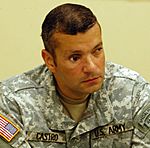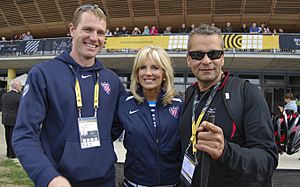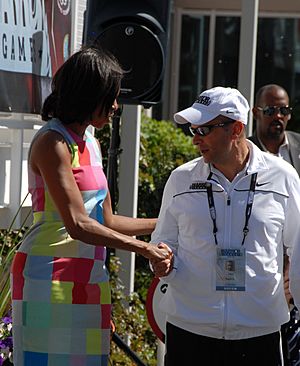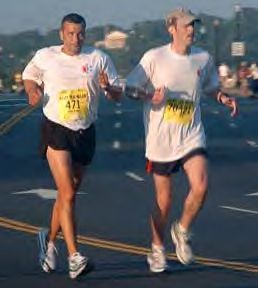Iván Castro facts for kids
Quick facts for kids
Iván Castro
|
|
|---|---|

Captain Iván Castro
|
|
| Born | 1967 (age 58–59) Hoboken, New Jersey |
| Allegiance | |
| Service/ |
|
| Years of service | 1987 – 2017 |
| Rank | |
| Unit | Special Operations Recruiting Battalion (SORB) - Assistant Operations Officer |
| Battles/wars | Operations Desert Storm/Shield Operation Iraqi Freedom Operation Enduring Freedom Operation Joint Forge Campaigns in Kosovo and Albania |
| Awards | Purple Heart Meritorious Service Medal Army Commendation Medal |
Iván Castro is a brave former officer in the United States Army. He was born in 1967. He continued to serve in the Army's special forces even after he lost his eyesight. He was one of only three blind officers in the U.S. Army. He was also the only blind officer in the United States Army Special Forces.
Before he retired in 2017, Castro helped with recruiting. He also helps other soldiers who were hurt in combat. He encourages them to get better, find jobs, and get an education. He is also a very active runner and takes part in many races and marathons.
Contents
Growing Up
Iván Castro was born in Hoboken, New Jersey. His parents were originally from Puerto Rico. In 1979, when he was 12 years old, he moved to Puerto Rico with his mother. He went to Antilles Military Academy there.
After high school, Castro attended the University of Puerto Rico. He had a scholarship for sports. He competed in track and field and cross country races. After college, he joined the US Army. He started as a Private First Class and became a Sergeant First Class. Later, he went to Officer Candidate School. He also earned another degree from Campbell University in North Carolina.
Military Service
Castro's Army career started in 1987. He took a special airborne course while in college. He also served in the Puerto Rico Army National Guard. In 1990, he joined the active U.S. Army. His first mission was supporting Operation Desert Storm/Desert Shield. After that, he served with a Pathfinder team in Kentucky.
In 1992, Castro moved to Germany. While there, he went to Bosnia twice to help with peacekeeping missions. Later, he became a drill sergeant at Fort Benning, Georgia.
In 1999, he joined the Special Forces. He became a Special Forces Weapons Sergeant. He traveled to Colombia, Belize, and Ecuador for missions. He also went to night school to finish his degree. In 2004, he became an officer. In 2005, he went to Afghanistan to help with elections.
Deployment to Iraq

By 2006, Castro was an experienced soldier. He was sent to Iraq as a scout platoon leader. In September 2006, Castro and his team were on a rooftop in Yusifiyah, near Baghdad. A mortar round exploded close to him.
The blast killed two of his fellow soldiers. Castro was severely wounded. Shrapnel hit his body, damaging his shoulder and arm. It also broke bones in his face and hurt his lungs. His protective eyewear was driven into his face.
Castro was taken to a hospital in Bethesda, Maryland. Doctors had to remove part of his finger. His right eye was gone, and he had metal in his left eye. Doctors were not sure if he would live. When he woke up, he was told he would never see again.
Castro stayed in the hospital for two months. He heard doctors talking about the Army Ten-Miler and the Marine Corps Marathon. He decided he would run both races. This became his goal.
Recovery and New Role
Castro spent 17 months recovering. He worked hard to become independent again. He ran and worked out regularly. He wanted to continue serving in the Army's Special Operations Command.
He was appointed executive officer for the 7th Special Forces Group. To prepare, he walked around the base. He measured the steps from his car to his office. He learned the area by memory. He said, "I know how many steps it takes from my car to my office. I know where the coffee machine is. I know where the bathroom is. I know where my desk is."
Castro became the only blind officer in the Special Forces. He was one of only three blind officers in the entire active-duty Army. In 2008, he was promoted to captain. In 2009, he graduated from a special course at Fort Benning. He was the first blind person to do so. He retired from the military in 2017 after 28 years of service.
Athletic Achievements
Castro has remained a very active athlete. By 2017, he had completed over 50 marathons. He trains with guides, like Major Phil Young and Lieutenant Colonel Fred Dummar. Audiences often cheer for him because of his amazing determination.
He has participated in many famous races. In 2007, he ran the Army Ten-Miler and the Marine Corps Marathon. In 2008, he ran the Bataan Memorial Death March Marathon, the Boston Marathon, and the United States Air Force Marathon. In 2009, he completed a 50-mile ultramarathon.
In 2014, he visited the South Pole with other wounded veterans. They trained by hiking and skiing. In 2017, Castro ran the Boston Marathon and the London Marathon just six days apart. He did this to support a mental health program called Heads Together.

Helping Others
Castro works to help blind people get funding for rehabilitation. He visits members of Congress to share his message. He received an award in Augusta, Georgia, thanking him for his service. The award was engraved in braille.
He also guides and supports other service members who have been injured. He was a main speaker at a big conference about technology and people with disabilities.
Writing
In 2016, Castro wrote a book about his life. It is called Fighting Blind.
Personal Life
Iván Castro has one son. In 2018, he was honored and added to the Puerto Rico Veterans Hall of Fame.
Awards and Decorations
Here are some of the military awards Castro has received:
|
|
See also
- List of Puerto Ricans
- List of Puerto Rican military personnel
- Army Wounded Warrior Program
 | Roy Wilkins |
 | John Lewis |
 | Linda Carol Brown |





